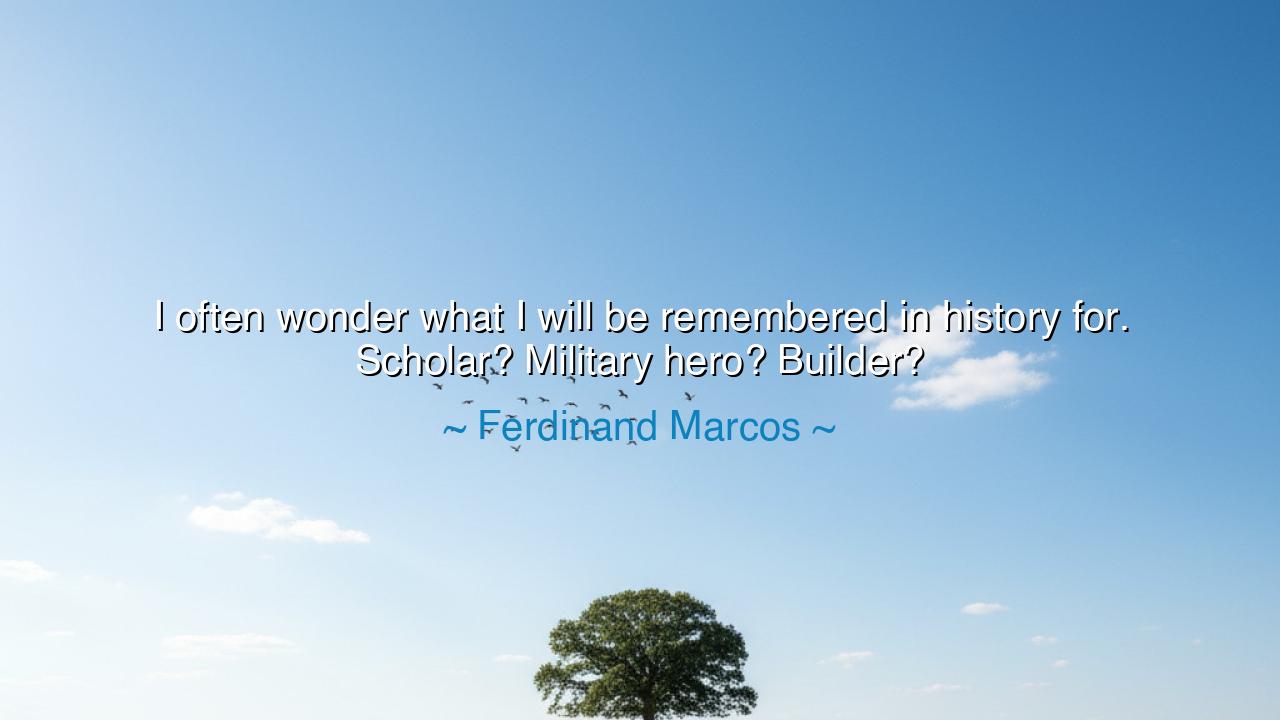
I often wonder what I will be remembered in history for. Scholar?
I often wonder what I will be remembered in history for. Scholar? Military hero? Builder?






“I often wonder what I will be remembered in history for. Scholar? Military hero? Builder?” — Thus spoke Ferdinand Marcos, once the ruler of the Philippines, whose name became a symbol both of ambition and controversy, of construction and corruption, of glory and ruin. His question is not merely the reflection of a man, but of every leader who gazes into the mirror of time and trembles before the verdict of history. For though men may wield power, build cities, and command armies, they cannot command how they will be remembered. History — that silent judge — writes with its own hand, and it writes not what men claim to be, but what they truly are.
To wonder what one will be remembered for is to confront the inescapable truth of mortality. Every ruler, every thinker, every common soul must one day yield to the dust of time. Yet before that moment comes, each seeks to leave a mark — a legacy that endures beyond flesh. In this yearning lies both greatness and peril. For some, it inspires the building of nations and the pursuit of wisdom; for others, it feeds the hunger for power and immortality. Marcos, in his question, reveals the tension of a man who wished to be seen as a builder of civilization, yet whose shadow grew larger than his light.
Indeed, in the early years of his reign, Marcos saw himself as a visionary, guiding his country toward progress. Roads were paved, cities rose, and the promise of a new era shimmered on the horizon. Yet beneath this gleaming surface, the pillars of freedom began to crack. The pursuit of greatness, unchecked by humility, turned to tyranny. What was once the dream of a builder became the fortress of a dictator. And thus, his question — “What will I be remembered for?” — became not a prophecy of glory, but a mirror reflecting the dual nature of man: the power to create and the power to destroy.
History offers many such mirrors. Napoleon Bonaparte, too, dreamt of eternal remembrance. He envisioned himself as a liberator, a bringer of law and order to Europe. He built empires, reformed governments, and carried the torch of revolution across continents. Yet in the end, he was remembered as both genius and tyrant, hero and usurper — his brilliance inseparable from his downfall. So too with Marcos: the monuments of his rule still stand, yet they cast long shadows. For history remembers not only the builder, but the cost of the building.
There is wisdom in this, for it reminds us that legacy cannot be engineered by pride. The great mistake of many rulers is to believe they can shape how posterity will see them. Yet history is not a servant; it is a river, carrying truth long after the hands that built it have turned to dust. The pharaohs built pyramids to proclaim divinity, yet we remember them now as kings who enslaved their people. The emperors of Rome built marble temples, but it is not the stone that endures — it is the lesson of their excess and fall. So too, the monuments of Marcos stand not merely as symbols of progress, but as reminders of the fragility of power and the price of unbridled ambition.
And yet, in Marcos’s question lies something profoundly human. For to ask, “How will I be remembered?” is not the question of a tyrant alone, but of every soul who seeks meaning. We all wish to leave something behind — a kindness, a creation, a memory that whispers, “I was here.” The tragedy of Marcos is not merely what he built or destroyed, but that in seeking greatness, he lost sight of virtue — the true foundation of remembrance. For it is not titles or monuments that keep a name alive, but the goodness of one’s deeds.
Let this be your lesson: do not live to be remembered, live to be worthy of remembrance. Do not chase after glory carved in stone, but pursue integrity, which time cannot erode. The scholar’s knowledge fades, the soldier’s victories are forgotten, and the builder’s monuments crumble — but the heart that acted with honor remains eternal in the memory of humankind.
For in the end, history is not written by what we claim to be, but by the truth our actions reveal. And when your own day of judgment comes — not before the world, but before your own conscience — may you not need to ask, “What will I be remembered for?” May your life itself be the answer.






AAdministratorAdministrator
Welcome, honored guests. Please leave a comment, we will respond soon